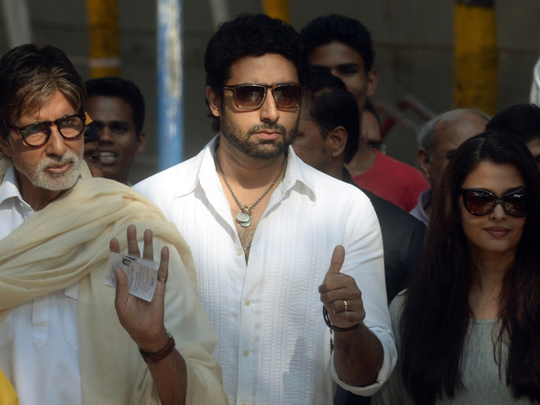
Mumbai: A city that is notorious for an abysmally low turnout during elections — whether parliamentary or assembly — Mumbai has registered a 53 per cent voting percentage, much higher than 41.4 per cent reported in 2009.
All the cajoling done to get voters to the polling stations worked in the six parliamentary seats where, despite the summer heat, voters managed to come out to exercise their franchise and not treat the day as a holiday.
Mumbai boasts a voting population of 9.7 million and though many feel it could have done even better, most people who worked hard to whip up awareness among voters are pleased at the turnout.
The day started very slowly and there was utter frustration and disappointment as the voter turnout at 3pm was between 32 and 40 per cent. At an average of 35 per cent, compared to other states like Tamil Nadu, Bihar and Puducherry, which had seen a turnout of more than 60 per cent, 55 per cent and 70 per cent respectively by that time, Mumbai seemed like a hopeless case.
But by evening the mood had changed.
The city’s six seats, neighbouring Thane and Kalyan and others in Maharashtra — Nandurbar, Dhule, Nashik, Raver, Jalgaon, Jalna, Aurangabad, Dindori, Bhiwandi, Palghar and Raigad — were among the 117 constituencies in 12 states that went to polls on Thursday.
Said Sharad Kumar, Maharashtra coordinator for Election Watch of Association of Democratic Reforms (ADR): “We thought this time there would be a big change for the better after so much coverage given to elections by both TV and print media, various methods tried and enticements offered to make Mumbaikars vote. Fortunately it worked.”
According to him, Mumbai cannot be compared to other constituencies as it is a cosmopolitan city unlike Tamil Nadu, West Bengal and Delhi which are politically-oriented. Delhi is also concerned about a government that is still not in place.
Polling for 19 seats in Maharashtra in the third and final phase of the Lok Sabha elections in the state where 338 candidates are contesting began at 7am when most of high profile candidates as well as celebrities went to the polling booths in their localities. Some of the toughest battles are being fought by Milind Deora, Priya Dutt, Gurudas Kamath, Eknath Gaikwad and Sanjay Nirupam of the Congress and Sanjay Dina Patil of Nationalist Congress Party (NCP) who swept Mumbai with a win in 2009.
New-comers like banker-turned-politician Meera Sanya and activist Medha Patkar of Aam Aadmi Party and Poonam Mahajan, daughter of the late BJP leader Pramod Mahajan, are contesting this time and are likely to cause division of both Congress-NCP and BJP votes.
MP Manikrao Gavit is trying his luck for the 10th consecutive term from tribal-dominated Nandurbar seat whilst NCP leader Chhagan Bhujbal is for the first time contesting for the parliamentary elections.
Of the 338 candidates in the electoral fray, 149 are independents and only 26 women. Out of the total 31.7 million voters, 17 million are men and 14 million women.
Of the registered main parties, the BJP is contesting in 11, Shiv Sena 8, Congress 10, NCP 8, CPI 2 and CPM 3 seats. The Bahujan Samaj Party is contesting all 19 seats. The Election Commission put up 34,343 polling stations for the exercise.
There have been numerous complaints of names missing from the electoral list and many voters returned disappointed after being turned away despite having their voter ID cards.
But Kumar says that voters should ensure beforehand by checking that their names are on the voters’ list, since there was a drive since last October to create awareness about that issue.
He says, “Actor Rahul Bose didn’t find his name on the voters’ list but he took the trouble to check out with the Election Commission office and his name was included.”
Many activists like Kumar say voting should be made compulsory in India.
ADR now plans to rectify the problems in the voters’ list before the state assembly elections at the end of the year.












